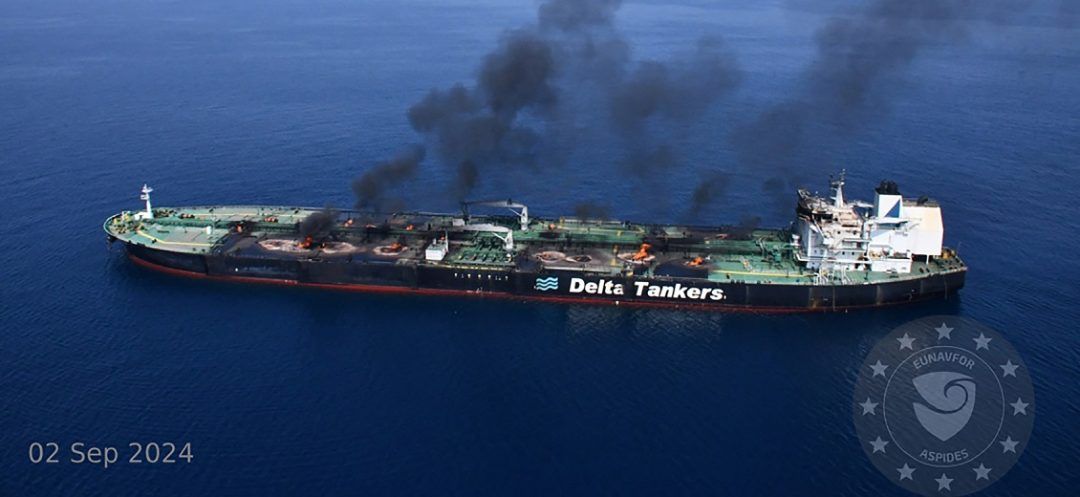- Home
- War in the Middle East
- Salvage Operation Underway for Stricken Red Sea Tanker

©This handout picture provided by EUNAVFOR ASPIDES on September 5, 2024, and dated September 2, shows smoke and fire aboard the Greek-owned oil tanker Sounion off the coast of Hodeida in the Red Sea. (Photo by EUNAVFOR ASPIDES / AFP)
An operation to tow an abandoned tanker struck by Houthis in August, threatening environmental disaster, began on Saturday and is still ongoing, a Greek Defense Ministry source told AFP.
The Greek-flagged Sounion is being towed northwards under military escort, the source said.
The tanker was hit last month by Iran-backed Houthis off the coast of Hodeida while carrying 150,000 tonnes of crude oil.
"(The tugboat) Aigaion Pelagos has begun to gradually tow the tanker northwards, escorted by military vessels," the Defense Ministry source told AFP, adding that the ship’s radars had been turned off for security reasons.
The official added that a rescue team had boarded the tanker and attached tow cables, overcoming "adverse conditions."
The source added that an update would be provided once the tanker is safely out of the area.
Greek state news agency ANA said the tugboat was escorted by three frigates, helicopters and a special forces team, without disclosing the countries of origin.
A Greek fire ship also stood ready to lend assistance if required, ANA said.
The tanker had been anchored west of the Houthi-held port city of Hodeida, midway between Yemen and Eritrea.
The European Union's Red Sea naval mission, Aspides, earlier on Saturday said that the salvage operation of the Sounion "is essential in order to avert a potential environmental disaster in the region."
"To achieve this, several public and private actors are working together," it added.
The Greek-flagged oil tanker Sounion was hit by missiles off the coast of Hodeida on August 21.
After the initial strike, the Houthis returned and detonated charges on the ship's deck, setting off new fires.
Damage to the vessel had threatened a Red Sea oil spill four times the size of the 1989 Exxon Valdez disaster off Alaska.
The Sounion's crew – made up of 23 Filipinos and two Russians – was rescued the day after the attack by a French frigate serving with the EU mission.
The EU naval force was formed in February to protect merchant vessels in the Red Sea from attacks by the Houthis, who have waged a campaign against international shipping that they say is intended to show solidarity with Hamas in its war with Israel in the Gaza Strip.
Since November, the Houthi attacks have resulted in the sinking of two ships and the deaths of at least four crew members.
The Houthis have been firing drones and missiles at ships in the vital commercial route, saying they are targeting vessels linked to Israel, the United States and Britain in a show of solidarity with Palestinians over the Israel-Hamas war in Gaza.
A salvage operation had been attempted earlier this month, but Aspides at the time had said that "the private companies responsible for the salvage operation have concluded that the conditions were not met to conduct the towing operation and that it was not safe to proceed."
On Friday, the mission said it stood ready "to facilitate a new salvage operation in the coming days."
Aspides reported on Friday that the vessel was still on fire as of September 12, but there were no signs of an oil spill from the main cargo hold.
Vassilis Terzakis and John Hadoulis, with AFP
The Greek-flagged Sounion is being towed northwards under military escort, the source said.
The tanker was hit last month by Iran-backed Houthis off the coast of Hodeida while carrying 150,000 tonnes of crude oil.
"(The tugboat) Aigaion Pelagos has begun to gradually tow the tanker northwards, escorted by military vessels," the Defense Ministry source told AFP, adding that the ship’s radars had been turned off for security reasons.
The official added that a rescue team had boarded the tanker and attached tow cables, overcoming "adverse conditions."
The source added that an update would be provided once the tanker is safely out of the area.
Greek state news agency ANA said the tugboat was escorted by three frigates, helicopters and a special forces team, without disclosing the countries of origin.
A Greek fire ship also stood ready to lend assistance if required, ANA said.
The tanker had been anchored west of the Houthi-held port city of Hodeida, midway between Yemen and Eritrea.
The European Union's Red Sea naval mission, Aspides, earlier on Saturday said that the salvage operation of the Sounion "is essential in order to avert a potential environmental disaster in the region."
"To achieve this, several public and private actors are working together," it added.
Oil Spill Fears
The Greek-flagged oil tanker Sounion was hit by missiles off the coast of Hodeida on August 21.
After the initial strike, the Houthis returned and detonated charges on the ship's deck, setting off new fires.
Damage to the vessel had threatened a Red Sea oil spill four times the size of the 1989 Exxon Valdez disaster off Alaska.
The Sounion's crew – made up of 23 Filipinos and two Russians – was rescued the day after the attack by a French frigate serving with the EU mission.
The EU naval force was formed in February to protect merchant vessels in the Red Sea from attacks by the Houthis, who have waged a campaign against international shipping that they say is intended to show solidarity with Hamas in its war with Israel in the Gaza Strip.
Since November, the Houthi attacks have resulted in the sinking of two ships and the deaths of at least four crew members.
The Houthis have been firing drones and missiles at ships in the vital commercial route, saying they are targeting vessels linked to Israel, the United States and Britain in a show of solidarity with Palestinians over the Israel-Hamas war in Gaza.
A salvage operation had been attempted earlier this month, but Aspides at the time had said that "the private companies responsible for the salvage operation have concluded that the conditions were not met to conduct the towing operation and that it was not safe to proceed."
On Friday, the mission said it stood ready "to facilitate a new salvage operation in the coming days."
Aspides reported on Friday that the vessel was still on fire as of September 12, but there were no signs of an oil spill from the main cargo hold.
Vassilis Terzakis and John Hadoulis, with AFP
Read more



Comments